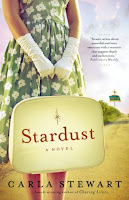Stardust by Carla Stewart
Shortly after burying her unfaithful husband, Georgia Peyton unexpectedly inherits the derelict Stardust motel from a distant relative. Despite doubts from the community and the aunt who raised her, she is determined to breathe new life into it. But the guests who arrive aren't what Georgia expects: Her gin-loving mother-in-law; her dead husband's mistress; an attractive but down-on-his-luck drifter who's tired of the endless road; and an aging Vaudeville entertainer with a disturbing link to Georgia's past.
Shortly after burying her unfaithful husband, Georgia Peyton unexpectedly inherits the derelict Stardust motel from a distant relative. Despite doubts from the community and the aunt who raised her, she is determined to breathe new life into it. But the guests who arrive aren't what Georgia expects: Her gin-loving mother-in-law; her dead husband's mistress; an attractive but down-on-his-luck drifter who's tired of the endless road; and an aging Vaudeville entertainer with a disturbing link to Georgia's past.
Can Georgia find the courage to forgive those who've betrayed her, the grace to shelter those who need her, and the moxy to face the future? And will her dream of a new life under the flickering neon of the STARDUST ever come true?
With the death of author Maeve Binchy yesterday, Twitter was awash with quotes from and about her books. One line from Ms. Binchy herself immediately made me think of this book: “I don't have ugly ducklings turning into swans in my stories. I have ugly ducklings turning into confident ducks.” Georgia Peyton is widowed, raising two daughters and nearly broke. With no experience as anything but a housewife, she sets out to remake the Stardust motel. Part of her transformation involves uncovering the secrets clouding her childhood and surrounding her husband's death. But it wasn't the ugly duckling or the mystery - although both are very good - that made this a five-star book on my list.
I was fascinated with the setting and the era. My family took a vacation each summer, usually to the mountains, and sometimes stayed in small, cabin-style motels similar to the Stardust. Though that would have been a decade later than the 1950's setting of the book, the giant chain hotels were yet to take over. Reading Stardust brought back some fond memories. It also introduced me to the polio epidemic.
Poliomyelitis was rampant in the U.S. in the first half of the twentieth century and reached it's height in the early 1950's, with over 50,000 cases in 1952. I've met several people who contracted polio as a child and were left with twisted or paralyzed limbs, and I've heard stories of iron lungs, but they were distant stories to me - something that happened to someone else before I was born. I had no idea of the fear that gripped communities where someone contracted polio or the torture of treatment in an iron lung. I recall, as a child, collecting and saving dimes in cardboard folders to be contributed to the March of Dimes, but had no clue why. Reading Stardust was an eye-opener for me, as well as a good story.
I'm recommending Stardust, both as a good read and as a history lesson. If you read it and become curious about the history of polio and it's effects on individuals and the nation, I recommend the Smithsonian Institute's site Whatever Happened to Polio? Both are fascinating reading.
I received a free copy of this book from the publisher - Faith Words - as part of a Twitter contest.
I was fascinated with the setting and the era. My family took a vacation each summer, usually to the mountains, and sometimes stayed in small, cabin-style motels similar to the Stardust. Though that would have been a decade later than the 1950's setting of the book, the giant chain hotels were yet to take over. Reading Stardust brought back some fond memories. It also introduced me to the polio epidemic.
Poliomyelitis was rampant in the U.S. in the first half of the twentieth century and reached it's height in the early 1950's, with over 50,000 cases in 1952. I've met several people who contracted polio as a child and were left with twisted or paralyzed limbs, and I've heard stories of iron lungs, but they were distant stories to me - something that happened to someone else before I was born. I had no idea of the fear that gripped communities where someone contracted polio or the torture of treatment in an iron lung. I recall, as a child, collecting and saving dimes in cardboard folders to be contributed to the March of Dimes, but had no clue why. Reading Stardust was an eye-opener for me, as well as a good story.
I'm recommending Stardust, both as a good read and as a history lesson. If you read it and become curious about the history of polio and it's effects on individuals and the nation, I recommend the Smithsonian Institute's site Whatever Happened to Polio? Both are fascinating reading.
I received a free copy of this book from the publisher - Faith Words - as part of a Twitter contest.


Love the cover and like the sound of it as well. Thanks for mentioning it.
ReplyDeleteSounds like this book has warmth and humor, also?
ReplyDeleteNice review! Learning new things is always good, IMO. This book sounds good. I'm going to keep an eye out for it.
ReplyDeleteHmm. Looks like it has a lot going on. I love the thought from Maeve.
ReplyDelete